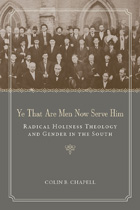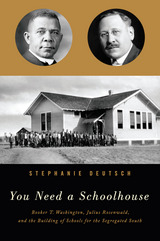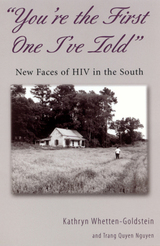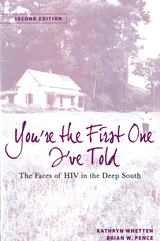4 start with Y start with Y

Modernity remade much of the world in the late nineteenth and early twentieth centuries and was nowhere more transformational than in the American South. In the wake of the Civil War, the region not only formed new legal, financial, and social structures, but citizens of the South also faced disorienting uncertainty about personal identity and even gender itself. Ye That Are Men Now Serve Him traces the changes in southern gender roles during the New South period of 1877–1915 and demonstrates that religion is the key to perceiving how constructions of gender changed.
The Civil War cleaved southerners from the culture they had developed organically during antebellum decades, raising questions that went to the very heart of selfhood: What does it mean to be a man? How does a good woman behave? Unmoored from traditional anchors of gender, family, and race, southerners sought guidance from familiar sources: scripture and their churches. In Ye That Are Men Now Serve Him, Colin Chapell traces how concepts of gender evolved within the majority Baptist and Methodist denominations as compared to the more fluid and innovative Holiness movement.
Grounded in expansive research into the archives of the Southern Baptist Convention; Methodist Episcopal Church, South; and the Holiness movement, Chapell’s writing is also enlivened by a rich trove of primary sources: diaries, sermons, personal correspondence, published works, and unpublished memoirs. Chapell artfully contrasts the majority Baptist and Methodist view of gender with the relatively radical approaches of the emerging Holiness movement, thereby bringing into focus how subtle differences in belief gave rise to significantly different ideas of gender roles.
Scholars have explored class, race, and politics as factors that contributed to contemporary southern identity, and Chapell restores theology to its intuitive place at the center of southern identity. Probing and illuminating, Ye That Are Men Now Serve Him offers much of interest to scholars and readers of the South, southern history, and religion.

Washington, though widely admired, had weathered severe crises both public and private in his fifty-six years. He had dined with President Theodore Roosevelt and drunk tea with Queen Victoria, but he had also been assaulted on a street in New York City. He had suffered personal heartbreak, years of overwork, and the discouraging knowledge that, despite his optimism and considerable success, conditions for African Americans were not improving as he had assumed they would. From within his own community, Washington faced the bitter charge of accommodationism that haunts his legacy to this day. Despite their differences, the two men would work together well and their collaboration would lead to the building of five thousand schoolhouses. By the time segregation ended, the “Rosenwald Schools” that sprang from this unlikely partnership were educating one third of the South’s African American children. These schoolhouses represent a significant step in the ongoing endeavor to bring high quality education to every child in the United States—an ideal that remains to be realized even today.

In the second wave of the HIV epidemic, those with the disease are more likely to be female, young, heterosexual, a racial minority, and rural-living than in the past. An understanding of the vastly different lives of this second wave of HIV-infected persons is vital to the development of user-friendly health care systems.
"You're the First One I've Told" offers a view into the lives of men and women infected with HIV. The experiences of twenty-five people living with this disease in rural eastern North Carolina serve as the foundation of this book, which also draws upon unique HIV/AIDS survey data collected by the authors and statistics from the Southeastern United States. This combination of qualitative and quantitative information provides readers with a vivid description of how people live with HIV/AIDS in the midst of their often traumatic lives, and why they manage their illness in ways that seem to contradict mainstream medical and social wisdom. The people interviewed represent a variety of races, genders, professions, family lives, and medical and social service access and utilization.

The Deep South has seen a 36 percent increase in AIDS cases while the rest of the nation has seen a 2 percent decline. Many of the underlying reasons for the disease’s continued spread in the region—ignorance about HIV, reluctance to get tested, non-adherence to treatment protocols, resistance to behavioral changes—remain unaddressed by policymakers.
In this extensively revised second edition, Kathryn Whetten and Brian Wells Pence present a rich discussion of twenty-five ethnographic life stories of people living with HIV in the South. Most importantly, they incorporate research from their recent quantitative study, “Coping with HIV/AIDS in the Southeast” (CHASE), which includes 611 HIV-positive patients from North Carolina, South Carolina, Georgia, Alabama, and Louisiana. This new edition continues to bring the participants’ voices to life while highlighting how the CHASE study confirmed many of the themes that originally emerged from the life histories. This is the first cohesive compilation of up-to-date evidence on the unique and difficult aspects of living with HIV in the Deep South.
READERS
Browse our collection.
PUBLISHERS
See BiblioVault's publisher services.
STUDENT SERVICES
Files for college accessibility offices.
UChicago Accessibility Resources
home | accessibility | search | about | contact us
BiblioVault ® 2001 - 2024
The University of Chicago Press









